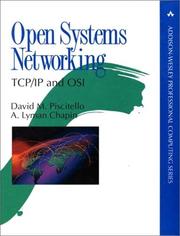
Open systems networking
By David M. Piscitello, A. Lyman Chapin
Subjects: OSI (Computer network standard), Tcp/ip (computer network protocol), Computer networks, Osi (computer network standard), TCP/IP (Computer network protocol), IETF, ITU
Description: 1993 book written when TCP/IP was still relegated to academia and "nerds", and OSI was the choice of the "[establishment][1]". Quoting the intro: >Open systems—in particular, Open Systems Interconnection (OSI) and TCP/IP—are all the rage. There are plenty of books that discuss OSI and plenty more that discuss TCP/IP. However, despite the facts that the architecture and goals of OSI and TCP/IP are essentially the same, and that they are really just currently popular manifestations of the same fundamental principles and techniques, no previous book has examined the two in parallel. This book covers both Open Systems Interconnection and the Internet architecture and protocols, commonly known as TCP/IP. There are many compelling reasons for examining these architectures in parallel, which is what this book intends to do. Also: >Open Systems Networking: TCP/IP and OSI compares and contrasts the OSI approach with the TCP/IP approach in what is intended to be an evenhanded and pragmatic fashion, taking sides on technical issues when appropriate but avoiding the political-party fervor with which the comparison is often fraught. For example, if the question “What does OSI’s MHS add to message handling that TCP/IP’s SMTP lacks?” is interpreted as biased in favor of OSI, the balance is eventually restored when the question “Why has SNMP, not CMIP, been so widely embraced by the industry?” is also posed and answered. In some areas, the book may appear to be almost chaotically neutral, suggesting, for example, that TCP/IP’s Simple Network Management Protocol might be used over OSI’s connectionless transport protocol to manage OSI network resources or that the OSI Directory be used over TCP/IP to provide an array of information services. Although this might be interpreted as heresy (or at least disloyalty) by purists in the OSI and TCP/IP communities, the authors believe that it serves the user community much better than orthodoxy, since it demonstrates that open systems networking is about solving communications problems, not creating or complicating them. [1]: http://www.npr.org/2016/03/07/469552618/politics-podcast-why-doesnt-anybody-want-to-be-establishment
Comments
You must log in to leave comments.